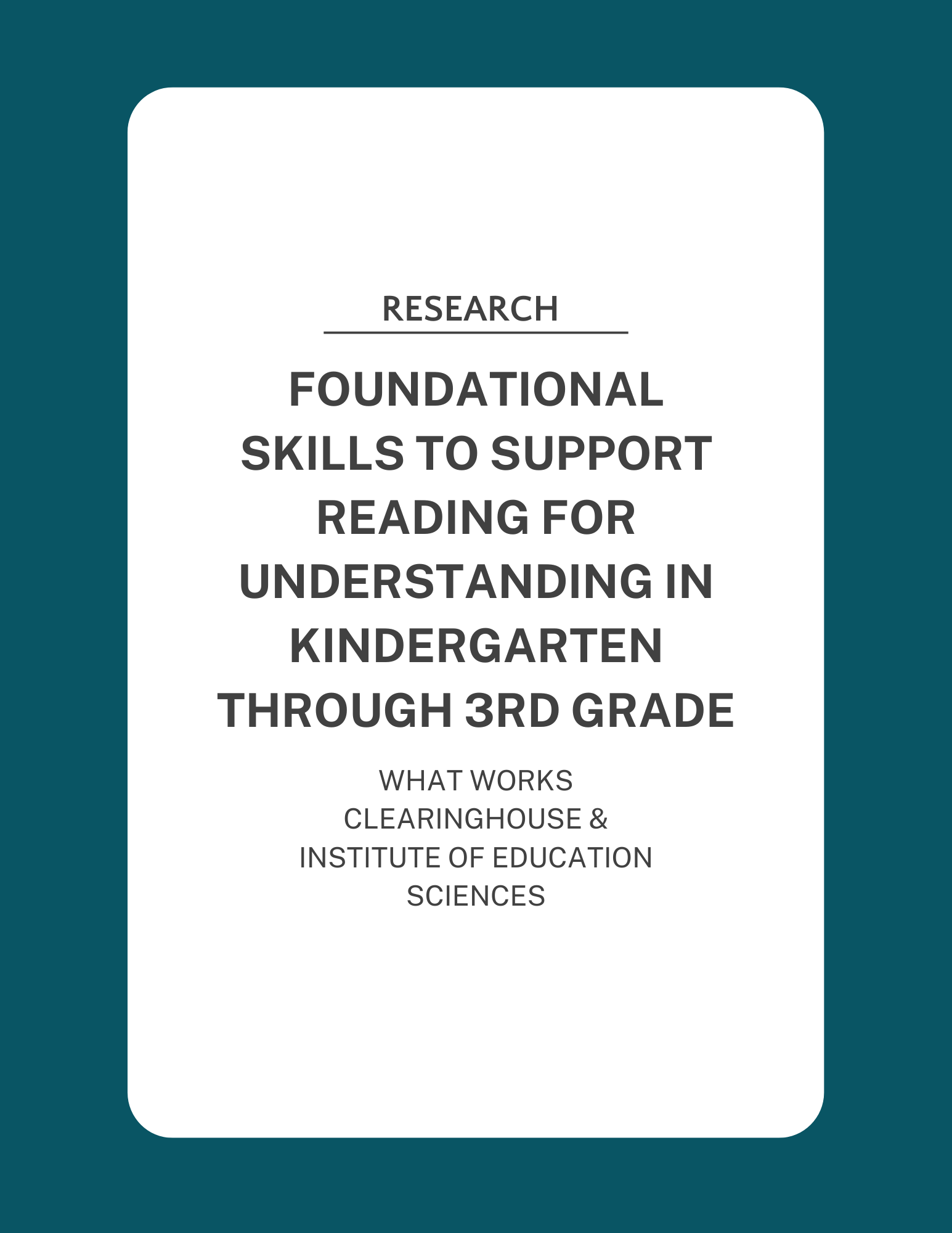Research
“Literacy is a fundamental human right. It is an instrument of empowerment to improve one’s health, one’s income, and one’s relationship with the world.”
- UNESCO
The Science of Reading is “a vast, interdisciplinary body of scientifically-based research about reading” that serves as a framework for how to develop proficient readers and writers (The Reading League). In 2000, the National Reading Panel Report identified "the big five" essential components of effective reading instruction: phonemic awareness, phonics, oral reading fluency, vocabulary, and comprehension. Scarborough's Reading Rope is a visual representation of how these multiple strands work together and lead to skilled reading.
The word recognition strand of the reading rope, often referred to as foundational skills, is taught in grades K-2, whereas language comprehension, such as vocabulary and knowledge-building, is much more complex and develops over a reader’s lifetime. While some students learn how to read through broad instruction, explicit and systematic instruction is necessary for most. Research shows that almost all students are capable of learning to read when they receive research-based instruction.
Education Advisory Board. Narrowing the Third-Grade Reading Gap - Embracing the Science of Reading. pg. 7.
Highlighted Research
Literacy leaders are learning, sharing, and acting on literacy research and evidence-based instructional practices to ensure all students become strong readers.
Three resources helping to guide the work:
Research Recap: Early Reading Accelerators: This resource from Student Achievement Partners highlights the research for early literacy as well as the crucial content necessary for proficient reading.
Foundational Skills to Support Reading Comprehension: This guide provides education practitioners with four concrete, research-backed recommendations for implementing foundational skills reading instruction that will positively impact students' reading growth.
Science of Reading Comprehension: This article from The Reading Teacher, written by Nell Duke, Alessandra Ward, and P. David Pearson, summarizes the research on reading comprehension and shares key elements for effective reading comprehension development.
Here is a sampling of readings leaders have explored.
Use the search menu below to access research by categories.
Teaching Children to Read: An Evidence-Based Assessment of the Scientific Research Literature on Reading and Its Implications for Reading Instruction
In 1997, the U.S. Congress initiated the formation of the National Reading Panel (NRP) to evaluate effective reading instruction methods. The NRP focused on key areas like phonemic awareness, phonics, fluency, comprehension, and teacher education in its assessment of the Scientific Research Literature on Reading and Its Implications for Reading Instruction.
Foundational Skills to Support Reading for Understanding in Kindergarten Through 3rd Grade
This guide provides education practitioners with concrete recommendations for implementing foundational skills reading instruction into their practices in order to build their students' foundational reading skills effectively. The guide offers four, research-backed recommendations that will positively impact students' growth.
Foundational Skills Guidance Documents Grades K-2
This document outlines guidance around foundational skills that are necessary to incorporate in K-2 reading instruction. Foundational skills include: print concepts, phonological awareness, phonics and word recognition, and fluency. Educators should utilize this guide along with already developed instructional materials in order to apply these skills into practice.
How to Reach Older Struggling Readers
This post discusses addressesing the challenge of supporting struggling older readers by dispelling misconceptions about phonics instruction. The article emphasizes the importance of implementing strategies like multisyllabic word reading and structural analysis to help older students improve their reading skills. It calls for a paradigm shift in reading instruction to ensure equitable access to effective interventions for students of all ages and backgrounds.
The National Reading Panel Report: Practical Advice for Teachers
The National Reading Panel Report aims to build schools' knowledge of the reading research. The report provides educators with practical advice based on the learnings of K-12 reading research on key topics such as phonemic awareness, phonics, oral reading fluency, vocabulary, and comprehension.
The Science of Reading Progresses: Communicating Advances Beyond the Simple View of Reading
While the simple view of reading is helpful for communicating the importance of decoding and language comprehension in reading practices, employing a more active view of reading is useful for communincating advances of reading and the reading research. This articles sythensizes advances the sector has made in understanding reading (reading difficulties have a number of causes; decoding and work recognition overlap in meaninful ways; and active, self regulatory processes) in order to help practioners apply research into practice and identify interventions that support reading development.
Essential Practices in Early Literacy
The education field is equipped with robust, research-backed knowledge about the importance of literacy and how children learn to read. This guide discusses the importance of developing and implementing essential practices to improve literacy and long-term outcomes for all students.









